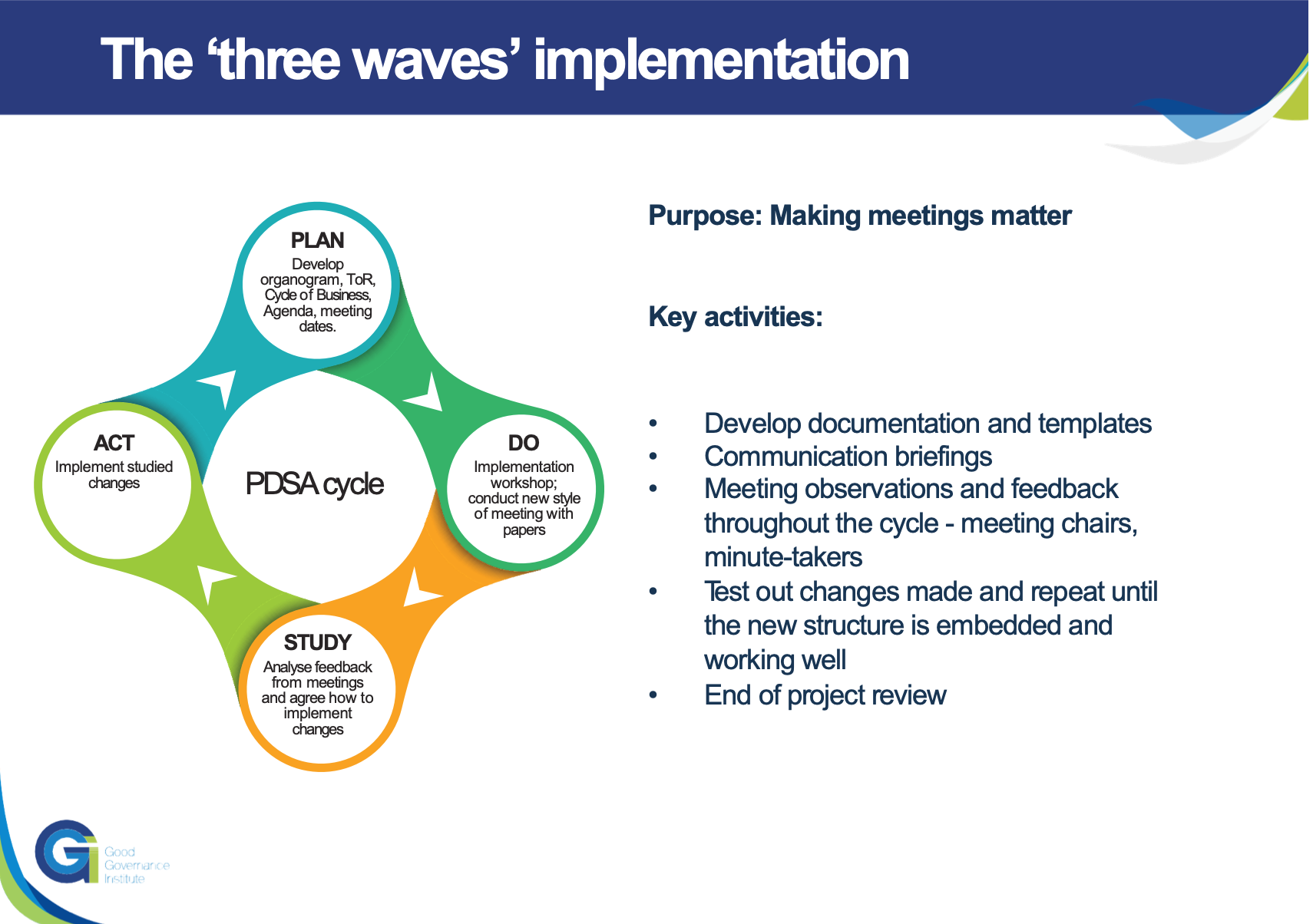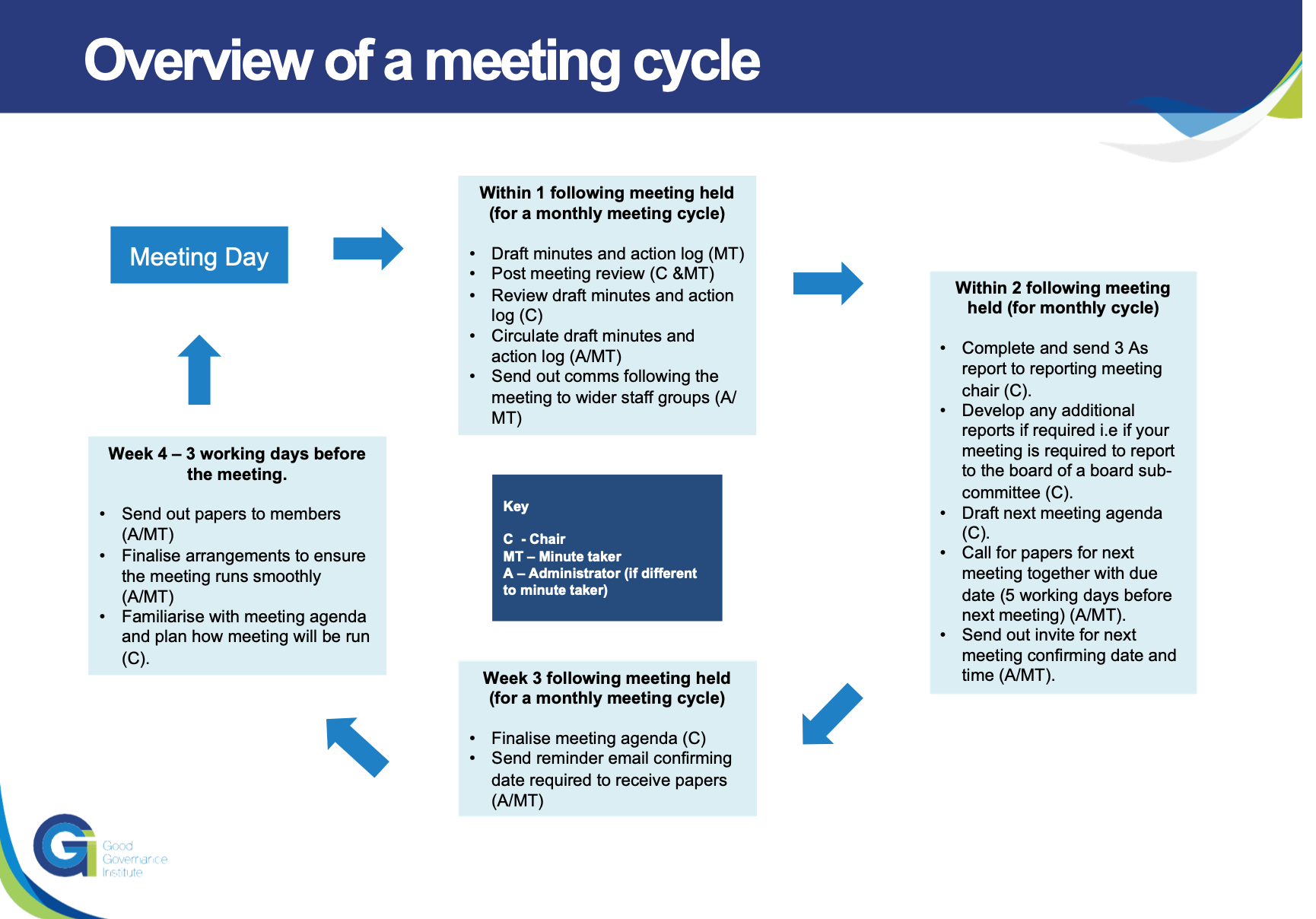Making meetings matter - David Holden
09 December 2021
Do you want to improve efficiency and reclaim hundreds of hours of wasted time per year across your organisation? Read on…
Executive directors, non-executive directors, senior managers and often front-line clinicians spend many hours in meetings. However, these meetings are not always as efficient or effective as they could be, and they may not fulfil the purpose for which they were established.
GGI has been working with NHS organisations to create meeting structures that are effective, support the objectives of the organisation and provide assurance to the board.
We estimate that we recently saved one NHS client over 1,000 hours of executive/ director time per annum by ditching more than 500 meetings. This represents a significant amount of time that can be given back to managing the organisation and providing direct patient care.
Our work has also helped to create a greater focus and understanding of how matters in relation to quality, safety and risk are reported from ‘ward to board’.
In this blog, we’ll outline steps you can take to begin to better understand how you may make meetings matter in your organisation.
Meeting basics
So, where to start… Here are some questions to consider
What is the purpose of this meeting?
Always ensure your meeting has a clear written purpose. Ask yourself and the group, why has this meeting been established? What is the scope of the work to be undertaken? What outputs/outcomes do we want? Who should be in the meeting to discuss these important matters? Are we covering the right areas? Are we following policy and good guidance and what is out of scope? Who are we reporting to? Who is reporting to us?
If you are unable to identify a clear meeting purpose, or your meeting is duplicating another meeting, or it is not reporting anywhere or adding additional value, it may be time to stop and challenge whether your meeting is really necessary or if it can be added to the agenda of another meeting.
We see many of our clients holding meetings simply because it provides a formalised structure for getting things done or because people feel safer with collective decision-making. But you don’t need 20 people around a table for two hours to make sure that actions are being progressed; activities and day to day decision taking can happen effectively outside of a formalised meeting structure with higher level assurance in place where you really need it.
Once you have a clearly defined and agreed your meeting purpose, we would suggest checking that all meetings have up-to-date and approved terms of reference (ToR). These should be reviewed each financial year to check that the group/committee is still meeting its purpose. Ensure that they answer the questions set out above. GGI can work with you to ensure you have clear, succinct and comprehensive terms of reference.
How do we organise our time?
To ensure there is time for the meeting to achieve its purpose and meet its terms of reference, every meeting should have an agreed cycle of business. This sets out the work plan for the year. It should be used to advise members and attendees when meetings are held and what papers/reports are required in advance. At least 95% of a meeting’s agenda should be known in advance if the ToR and cycle of business are correct. GGI can work with you to ensure you have a comprehensive cycle of business that sets out the matters to be reported and discussed over the course of a year.
To ensure there is a consistent, comprehensive and effective system for reporting, recording and monitoring the business of every meeting, GGI can work with you to develop and implement templates for meeting agendas, minutes, action logs, and front cover sheets for papers to be reported to the meeting.
How should we conduct our meetings?
Etiquette of meetings is important. Getting the mechanics but also the dynamics of a meeting right will achieve the best results. Having a clear meeting etiquette and/or charter for how your meeting will operate will keep it on track and should be used by the meeting chair and members to challenge any poor behaviour. GGI has information on how etiquette can be improved, including a charter that your organisation can agree.
The chairing of a meeting requires great skill. A good or great chairman can make meetings both productive and even fun. We can provide guidance and training on how to become a better chair of meetings.
The minute-taker or administrator of a meeting is vitally important. Your meeting secretariat takes notes of your meeting and produces minutes for ratification. It is vitally important that this role is taken seriously. When agreed, the minutes state what happened and what was agreed – often they will be used for the public record and for regulators to satisfy themselves about how an organisation is functioning – and remember, if it isn’t in the minutes, it didn’t happen. Again we provide training via our GGI Academy.
What should we discuss?
Don’t be tempted to overload an agenda. Good planning will help to prevent this. As well as a clear purpose for the meeting with a focus on what is needed, make sure you only include what you really need to discuss on your agenda.
Timing is everything. Try to make sure the agenda reflects your meeting purpose, and the meeting runs for no longer than it has to – preferably no longer than 90 minutes. You should plan in advance how long it is likely to take for each item to be introduced, discussed and a conclusion reached with possible recommendations for action.
At the start/early in the meeting:
Confirm/re-affirm the meeting purpose.
Record who is in attendance and who has given apologies. Is the meeting quorate?
Confirm minutes from the previous meeting.
Review actions on the action log and identify anything that needs escalating.
Identify any headline risks/issues that need immediate action or escalating.
Review any performance information/dashboards to help frame further discussion and debate.
During the meeting:
Ensure that clear notes are taken and identify action points. It is good practice for the chair of the meeting to summarise at the end of each agenda item, advising of any actions and who they are assigned to.
Steer the meeting through its agenda, ensuring each agenda item is kept to its allocated time.
Summarise the outcome of discussion, action and any issues to be escalated.
At the end of the meeting:
Ensure members review the meeting and advise on and agree the matters for reporting.
Plan, Do, Study, Act (PDSA)
We have been working with organisations over the years with our ‘three waves’ or ‘three cycles’ programme to help organisations hold better, more efficient meetings. The three waves of business is based on Walter Shewhart’s work from the 1920s on the Plan-Do-Study-Act (PDSA) model as outlined in the diagram below:


How can we help?
GGI can work with you to bring all these matters to life, to ensure that your organisation is working as efficiently and effectively as it possibly can be, and providing assurance where it matters.
Working with you, we can:
provide an improved understanding of your quality governance structures, cycles of business, and roles and responsibilities for your meetings
advise on how to hold more effective and purposeful meetings, with better information, discussion and decision making
help ensure your meetings have a greater focus on learning and continuous improvement, supporting the delivery of outstanding care
help you embed clear structures and rhythms of governance meetings in your care groups, divisions and operational units
help you evaluate your progress and ensure you have a clear plan for sustaining the improvements you have made for the years ahead.
We can really make a difference to the efficiency and effectiveness of your meetings – including your decision-making and decision-taking – which will save you valuable time that can then be devoted to patient care and managing your organisation.
Why not call us on 07732 681120 or email advice@good-governance.org.uk?
